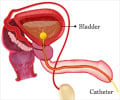Highlights: - Urinary tract
infection caused by E. coli is
normally treated with antibiotics
- Repeated
antibiotic use for recurrent infection could lead to antibiotic resistance
- A new approach
using mannosides could circumvent the need for antibiotics for E. coli urinary tract infection and
reduce the recurrence of infections
A
fresh approach using mannosides for the treatment of urinary tract infection
caused by E.coli has the potential to
prevent recurrence of the infection without the repeated need for antibiotics. A study
indicating the same was published in
Nature.
Escherichia
coli (E. coli) are common bacteria that spread through contaminated
food and water. Many
E coli residing
in the digestive tract do not cause digestive problems but can spread from the
anal region to the lower urinary tract resulting in symptoms of frequent
urination, urgency to pass urine, and a burning sensation while passing urine.
Urinary tract infections are more common and tend to be recurrent in women, due
to the smaller length of the urethra in females. Recurrent and untreated
infection can spread to and damage the kidneys, or increase the risk of
premature deliveries in pregnant women.
‘Treatment of E. coli urinary tract infection with mannosides appears to be an effective option to prevent recurrence of the infection and antibiotic resistance.’
. In the recent years,
stress has been placed on the importance of using antibiotics only when needed,
to prevent the development of resistance.
Antibiotic resistance refers to the ineffectiveness of
antibiotics due to incorrect use, for example, not completing the course of
treatment, or using an antibiotic for a viral infection.
Alternatives to
antibiotics for the treatment of urinary tract infection are the need of the
hour. Researchers are now evaluating the use of certain molecules called
mannosides to treat urinary tract infection.
Mannosides are chemically related to mannose, molecules to which the
bacteria attach and remain latched to the inner lining of the urinary tract.
The
E. coli have projections called pili with which they attach to
mannose receptors on the bladder cells and cause infection.
When mannosides are administered, the
bacteria attach to these similar molecules instead, and get flushed out when
the person urinates.
An
approach that uses mannosides has the potential to reduce the use of
antibiotics. Advantages of using such an approach include the following:
- The lethal effect
of antibiotics on normal gut bacteria is avoided. Normal gut bacteria keep
harmful bacteria at bay and maintain digestive health
- Antibiotic
resistance is avoided
The researchers tested
the possible effect of mannosides in preventing recurrent urinary tract
infection in mice.
They hypothesized
that if the E. coli population within
the gut is reduced, the chances of recurrence of urinary tract infection could
also reduce. They introduced
E. coli
into the bladder and the gut of mice. This was followed by three oral doses of
mannoside. The researchers found that:
- The bacteria were
almost completely eliminated from the urinary bladder
- The bacterial count in the gut was around a hundred
times lesser than before the treatment,
probably because the mannosides prevented the attachment of the bacteria
to the gut cells
- The count of the
normal bacteria in the gut that do not cause urinary infection was only
minimally affected
Mannosides
thus have a potential to not only treat a urinary tract infection but also
prevent recurrence. More importantly, as a result of their
mechanism of action,
they could also
eliminate antibiotic-resistant bacteria, without the need for stronger
antibiotics, which are often associated with more side effects. Clinical trials
should be able to confirm the possible benefits of this treatment in patients,
especially women, with recurrent urinary tract infection.
Reference:- Spaulding CM et al. Selective depletion of uropathogenic E. coli from the gut by a FimH antagonist. Nature (2017); doi:10.1038/nature22972
Source-Medindia














